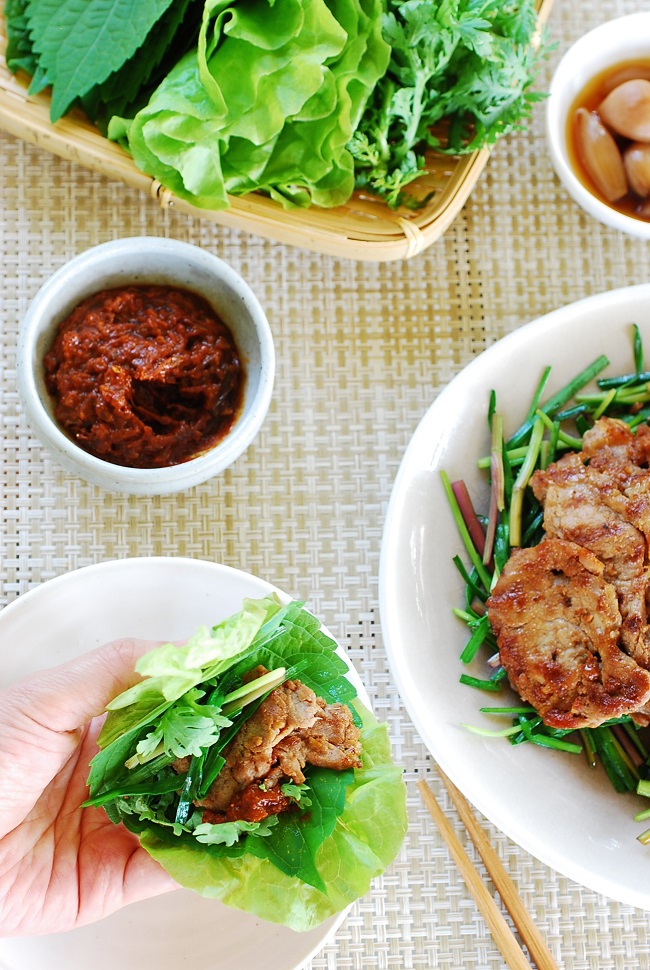The blog finally has a new look. I wanted a warm and clean look with user-friendly navigation and a recipe index with images. It’s getting there! While undertaking the makeover, I went with something I had long avoided – switching the blog host to WordPress from Blogger. I’m not tech savvy, so I didn’t want to change anything that’s complicated. But I learned some of the features I wanted to add to the blog (such as the recipe index with images) were easier to do with WordPress. The transition has been a bit painful, and it’s still undergoing. A lot of Blogger formatting has been lost during the transition. So you may see some of the posts are a little off in terms of spacing, image size and resolution, italics, etc. I’ve been spending a lot of time fixing the formatting, but it’s going to take a lot more time to get to all of them. Let me know if you encounter any other issues related to the transition.
Now let’s talk about today’s recipe. This doenjang (된장) marinated pork is another great option for your Korean BBQ this summer. Doenjang is Korean fermented soybean paste. No doubt the pork dish marinated in a spicy gochujang sauce — dwaeji bulgogi (aka jeyuk bokkeum) is more popular these days. But this preparation, which is also known as maekjeok (맥적), dates back to early Korean history long before chili peppers were introduced to Korea. Maek refers to people of Goguryeo (고구려), one of the three ancient Kingdoms, and jeok means skewered meat. Maekjeok evolved over time, and it’s believed to be the origin of today’s bulgogi. Over 1000 years later during Yi Dynasty, it was served in Royal Court as seen in the infamous Korean drama Daejanggeum (대장금), if you watched it.
Pork butt (aka Boston butt) is the best cut of meat for this dish. Pork loin works well too. The salty, savory doenjang adds a deep umami flavor to the pork without overpowering it. I added a little bit of acidity in the marinade to brighten the doenjang taste and bring the flavors together. Doenjang flavored pork pairs well with buchu (garlic chives). I served it on a bed of stir-fried garlic chives and minari (water dropwort). These vegetables are in season and can be found in Korean markets. Serve with red or green leaf lettuce, in which to wrap the meat, along with ssamjang.
Ingredients:
1 pound pork (Boston butt or loin), thinly sliced (about 1/4-inch thick)
For the marinade:
1-1/2 tablespoons doenjang (Korean fermented soybean paste)
2 tablespoons soy sauce
2 tablespoons rice wine
1 teaspoon vinegar or lemon juice
1 tablespoon sesame oil
2 tablespoons honey
1 tablespoon sugar
2 tablespoons grated onion
1 tablespoon minced garlic
1 teaspoon finely grated (or juiced) ginger
pepper to taste
Optional vegetables:
4 ounces buchu, garlic chives, (or mix with minari)
(If unavailable, substitute with 1 medium onion, thinly sliced)
salt to taste
oil for stir-frying
For the wraps:
1 or 2 heads of red or green leaf lettuce
10 to 15 perilla leaves (kkaennip)
crown daisy (ssukgat)
ssamjang
 Thinly slice the meat (about 1/4-inch thick), if not pre-sliced.
Thinly slice the meat (about 1/4-inch thick), if not pre-sliced.
 Combine all the marinade ingredients in a bowl and mix well.
Combine all the marinade ingredients in a bowl and mix well.
 Add the meat, and mix well until evenly coated. Marinate at least for 30 minutes.
Add the meat, and mix well until evenly coated. Marinate at least for 30 minutes.
 Cut the optional vegetables into 2 – 3 inch lengths. Heat a skillet with a tablespoon of oil, and briefly stir-fry the vegetables until slightly wilted. Salt to taste. Transfer to a plate.
Cut the optional vegetables into 2 – 3 inch lengths. Heat a skillet with a tablespoon of oil, and briefly stir-fry the vegetables until slightly wilted. Salt to taste. Transfer to a plate.
 Heat a grill pan or a skillet over medium high heat and add the pork slices. Immediately lower the heat to medium. The marinade will burn if the heat is too high. Cook until the pork is cooked through and slightly caramelized, one to two minutes each side. Turn over a couple of times to prevent the marinade from burning.
Heat a grill pan or a skillet over medium high heat and add the pork slices. Immediately lower the heat to medium. The marinade will burn if the heat is too high. Cook until the pork is cooked through and slightly caramelized, one to two minutes each side. Turn over a couple of times to prevent the marinade from burning.
Serve on a bed of the optional stir-fried vegetables along with the vegetables for the wraps and ssamjang.
For more grilling recipes, visit here.
The post Dwaejigogi Doenjang Gui (Doenjang Marinated Pork) appeared first on Korean Bapsang.






















